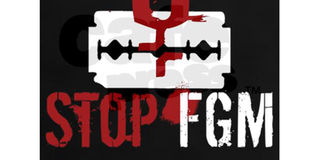Njuri Ncheke elders join campaign against FGM

Community awareness efforts must go beyond condemning FGM.
What you need to know:
- The elders made the commitment last week in Kathanwa during celebrations to mark the International Day of the Girl Child.
- Anti-FGM Board chairperson Ipato Surum stressed the need for urgent elimination of the archaic practice as one the best gifts the world can give to girls.
The fight against female genital mutilation (FGM) in Tharaka-Nithi County has received a major boost after the influential Njuri Ncheke, a Meru council of elders, committed to helping end the vice.
The elders made the commitment last week in Kathanwa during celebrations to mark the International Day of the Girl Child.
They appended their signatures to show their commitment, as did the county commissioner and local leaders, including politicians and clerics.
The elders are respected and their commitment is a major boost for the fight against the harmful practice.
Anti-FGM Board chairperson Ipato Surum stressed the need for urgent elimination of the archaic practice as one the best gifts the world can give to girls.
“FGM is the cause of many other challenges facing girls in the world today. I ask all leaders to invest in girl rights,” she said.
Men's involvement
Wilson Nyaga, Tharaka-Nithi Deputy Governor, implored all stakeholders to engage boys and men in the campaign. He said this would turn them into advocates and make them instrumental in protecting their sisters, nieces, aunts, cousins and wives.
Chuka MP Patrick Munene pledged his support and asked the Anti-FGM Board to partner with him in creating awareness at the community level.
Woman Representative Susan Ngugi said FGM was one of the causes of the triple threats to girls and women. She called for support and strengthening of the alternative rites of passage.
Tharaka-Nithi is one of the 22 FGM hotspot counties. It is the only county in Mount Kenya region where FGM is still been practised.
According to a 2017 report by Unicef, 71 per cent of women aged 15-49 in the county had experienced some form of FGM.
The recent Kenya Demographic Health Survey (KDHS) 2022, showed that 58 per cent of girls aged seven and 17 and 95 per cent of women over 50 have undergone FGM.
To slay the dragon of FGM, Tharaka Nithi, in collaboration with Plan International and the national government in 2021 developed and launched a robust anti-FGM policy.
The policy, adopted by the county assembly in May 2021, allows the county government to allocate funds to the fight against FGM. It was developed after public participation that involved residents, including elders, youth, reformed female circumcisers, children, county and national government officials, civil society, religious leaders, and community-based organisations.
Equality
The policy is grounded in the principles of gender equality, inclusivity, and non-discrimination. It provides the legal framework required to fast-track the eradication of FGM by creating decentralised structures coordinated from the ward to the county level.
The policy is further geared towards creating awareness and ensures FGM and child marriage survivors receive necessary medical treatment and psychosocial support.
Additionally, it strengthens the existing multi-sectoral coordination, collaboration, partnerships and networking for eradication of FGM, to address related gender inequality by promoting empowerment of girls and women and promoting community dialogues.
It seeks to set up a robust data, information and knowledge management system to aid in research, analysis and reporting of emerging dynamics. It is also helping in ensuring survivors are assisted to access justice and in the formation of the Ward Anti-FGM Policy committees to spearhead the fight from the village level.



